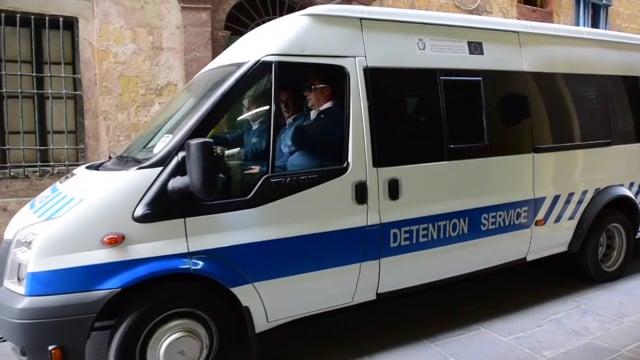[WATCH] Lawyer denounces indefinite detention of Malian deportees
Lawyer insists that indefinited detention is breach of the Constitution and the European Convention on Human Rights


Nine failed asylum seekers from Mali arrived in court shackled together, despite having spent some nine productive years in Malta pending a removal order which the government was unable to carry out.
The lawyer representing a group of failed asylum seekers fighting forced repatriation to Mali lashed out, in an urgent Constitutional sitting this morning, at the fact that the law allowed for the group’s indefinite detention until their case is decided.
Jamburu Jara, Issa Jaruke, Mama Sangare, Wali Traore, Selia Konate, Mamadou Camara, Segu Diba, Mamadou Traore and Ibrahim Camara sat in silence during the sitting.
Given the fact that the men had lived and worked in Malta for up to nine years, the necessity of their having been transported to and from the court, handcuffed together in pairs, raised an eyebrow or two amongst those present.

Lawyer Gianluca Cappitta explained to Madame Justice Lorraine Schembri Orland that the three-day time-frame within which an appeal against a removal order must be filed meant that there was effectively no legal means of redress for the nine Malians, who are to remain in detention until their deportation is finalised.
“They say that, if for the sake of the argument the removal order is valid, the detention must still be necessary. But it is not. The elements required to justify continuing to detain them are not present,” Cappitta said.
“They do not pose a threat to public order or security,” the lawyer argued. “Although the detention and deportation argument has roots in law... I am here because I feel there is a breach of the Constitution and the European Convention on Human Rights.”
Lawyer Victoria Buttigieg from the office of the Attorney General was in no doubt as to the eventual outcome, however telling Cappitta that “the deportation will take place…”.
Communications between the Maltese and Malian governments were made “in black on white” and the return was underway “at an accelerated pace.” Travel documentation and other formalities had all been finalised, she said. “All that remains to be done are the logistical arrangements.”
Buttigieg explained that upon arrival, illegal immigrants are given information of the possibility of appealing their removal order. They can give verbal notice of their intention to appeal the removal order against them and there is a 60-day time window for an asylum application to be filed. This application would suspend the execution of any removal orders, she said.
“In this case the order was issued and explained to the individuals... eventually their asylum application was rejected also at appeals stage and because they had no option to return to Mali they were released from detention.”
But in November 2016, Malta hosted a delegation from Mali, who are in talks with the Maltese authorities for repatriation, the lawyer explained. The delegation had spoken to the Malians and found that not all of them were actually from Mali. All but nine of the men were released.
Whilst it was true that removal orders had to be challenged within three days, the contestation of detention could be made at any time, she said. “We must be careful, because the other party is requesting its demands be upheld as an interim measure... this is not what an interim measure is for.”
The court interrupted, pointing out that it could and indeed, had, granted interim measures before. These would be subject to appeal, said the judge.
Cappitta insisted that he had not been shown the removal orders and neither had the court. The court, noting that the sitting had needed to be held with urgency because of the request for release, ordered that they be exhibited. “The court must see the order,” the judge asserted, admonishing the lawyer for not summoning someone to exhibit them. It then ordered the Attorney General to exhibit copy of return orders by 3rd January.
But even if the orders were above board, Cappitta said, “the detention is still not necessary. They are not a risk to the public or security. There is no element of justification for their continued detention. They are there literally waiting. The question is that there is no need for them to be detained while waiting for deportation for which there is no time-frame... I don’t feel that it is justified to detain them indefinitely...the detention is no longer necessary for proceedings to continue.”
The Attorney General’s representative argued that the plaintiffs have been given the information they needed and should have filed the case before. The court, however pointed out that the timing of filing a court case was their prerogative.
Interim measures are only issued in cases of risk of harm or torture, Buttigieg went on. The Malians’ application doesn’t mention the articles of the law protecting them from this, she pointed out, arguing that therefore the request was not justified.
The court will issue a decree from chambers before the next sitting, which will be for the tabling of the defendants' evidence.
Gianluca Cappitta is a member of Mifsud & Mifsud Advocates.






.jpg)











.png)



